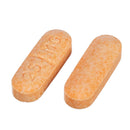





Carprofen is prescribed to relieve pain and inflammation caused by arthritis and other joint problems, so you can help your dog maintain her regular activity levels and quality of life. Carprofen may also help to reduce pain associated with surgeries and other painful conditions and works by limiting your dog's production of prostaglandins, which are substances that can trigger inflammation. Customers may receive this drug under the names Rimadyl, Novox, Carpaquin, Quellin, Vetprofen.
UsesCarprofen is indicated for the relief of pain and inflammation associated with osteoarthritis and for the control of postoperative pain associated with soft tissue and orthopedic surgeries in dogs.
Possible Side EffectsCarprofen is tolerated well in the vast majority of dogs, and the risk for side effects occurring appears to be less than 1%. But rarely, serious side effects (stomach ulcers, liver, or kidney problems) and sometimes death have been reported.
Side effects that may be serious or indicate a serious problem:
- Decrease or increase in appetite (eating less or more than normal), vomiting, changes in bowel movements (such as diarrhea, or black, tarry or bloody stools).
- Changes in behavior or activity levels (more or less active than normal), incoordination/weakness (eg, stumbling, clumsiness), seizure (convulsions) or aggression (threatening behavior/actions).
- Yellowing of gums, skin, or whites of the eyes (jaundice).
- Changes in drinking habits (frequency, amount consumed) or urination habits (frequency, color, or smell).
- Changes in skin (redness, scabs, or itchiness).
If you see any of these signs, stop giving the drug and contact your veterinarian immediately.
Drug & Food InteractionsNo known drug interactions have been reported.
PrecautionsThis class of drug may be associated with gastrointestinal, renal and hepatic toxicity. When nonsteroidal anti-inflammatory drugs inhibit prostaglandins that cause inflammation they may also inhibit those prostaglandins which maintain normal homeostatic function. This may result in clinically significant disease in pets with the underlying or pre-existing disease more often than in healthy pets. The use of parenteral fluids during surgery should be considered to reduce the potential risk of renal complications when using nonsteroidal anti-inflammatory drugs perioperatively.
NOTE: For Generic Medications, picture displayed may not depict actual product. Generic medications may vary from one order to the next by size, color and shape depending on manufacturer. Customers may receive the same drug under the names Rimadyl, Novox, Carpaquin, Quellin, Vetprofen.
